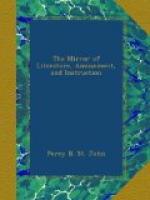Dr. Ken and Nell Gwynne.—When Charles II. went down to Winchester with the Court, the house of Dr. Ken was destined to be the residence of Nell Gwynne. The good little man declared that she should not be under his roof: he was as steady as a rock; and the intelligence was carried to the king, who said, “Well, then, Nell must take lodging in the city.” All the Court and divines were shocked at Dr. Ken’s strange conduct, saying that he had ruined his fortune, and would never rise in the church. Sometime after, the bishopric of Bath and Wells became vacant: the ministers recommended some learned and pious divines; to whom the king answered, “No, none of them shall have it, I assure you. What is the name of that little man at Winchester, that would not let Nell Gwynne lodge at his house?”—“Dr. Ken, please your majesty.”—“Well, he shall have it then; I resolved that he should have the first bishopric that fell, if it had been Canterbury.”—Bishop Ken every morning made a vow that he would not marry on that day. Mr. Cherry used frequently, on entering the breakfast-room, to say, “Well, my lord, is the resolution made this morning?”—“Oh, yes, sir, long ago,” was the constant reply. M.J.T.
Accession of Territory without Bloodshed.—The Venetians, desirous of possessing the island of Curzola, which belonged to the little republic of Raguza, and was situate in their neighbourhood, made use of a singular stratagem to render themselves masters of it. They erected in one night, on a little rock, which belonged to them, very near Raguza, a card-board fortress, painted of a brick-colour, and armed with wooden cannons. The next day the Ragusans, alarmed at seeing themselves so closely invested, entered into a negotiation with the Venetian State, to which they ceded Curzola, in exchange for this miserable rock, on which there was scarcely room for a moderately sized dwelling. W.N.
Excuses for not Marrying.—Thales, who was ranked among the seven wise men of Greece, declined involving himself by marriage in the cares of a family, that he might devote his whole time and attention to the study of philosophy,—alleging to his mother, who urged him to marry, at an early age, “it is too soon,” and at a more advanced period, “it is too late.” P.T.W.
* * * * *
Epigram on Sir P——p F——n——s being bit by a cobracappo:—
A serpent bit F—— ——s,
that virulent knight;—
What then? ’twas the serpent that
died of the bite.
Anon.
Latine.
Dente venenato stimulatur Zoilus Anguis,
Quid Tum? vivit adhuc Zoilus, Anguis obit.
E.B.I.
* * * * *
Botanical A.B.C.—The A.B.C. Daria is a name given to a plant of the camomile species. The appellation is designed to express the use made of this plant by the black schoolmasters at Amboyna, who cause their young pupils to chew the flowers and roots, either alone or with beetlenut, in order that they may more easily pronounce some of the difficult Arabic letters. It is similar to the Anthemis Pyrethrum, as stimulating the mouth, and is recommended in paralyses of the tongue. P.T.W.




